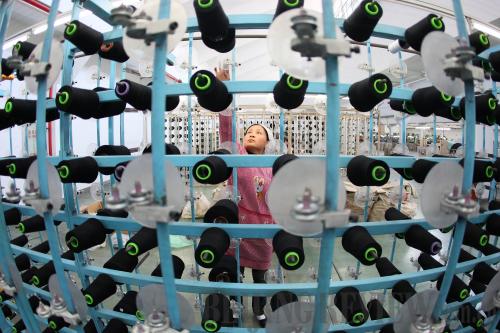|
 |
|
SPINDLES OF FORTUNE: An employee inspects machinery at Zhejiang Furun Textile Co. Ltd. Many private textile companies are trying to overcome the difficulties caused by higher cotton prices and labor costs (GUO BIN) |
However, financing has always been a bottleneck impeding the development of POEs. To make financing easier for them, the People's Bank of China, the central bank, has encouraged private capital to join in establishing rural banks and micro-credit companies. According to data from the People's Bank of China, by the end of 2010 China had more than 2,300 micro-credit companies, providing 162 billion yuan ($24.58 billion) in loans. In addition, by the end of 2009, more than 5,500 credit guarantee institutions had collected guarantee funds of 338.9 billion yuan ($51.43 billion) and offered guarantees to 370,000 SMEs, including POEs.
In addition, the central bank has specified that growth of loans to SMEs should not be lower than loan growth in general. The China Securities Regulatory Commission has also set up an SME board and growth enterprise board—ChiNext—at the Shenzhen Stock Exchange to help support financing for these enterprises.
Zheng said during the past five years the government has also strengthened its fiscal and tax support to the private economy. In 2010 the Central Government allocated 12.3 billion yuan ($1.87 billion) to support SME development, 2.7 billion yuan ($409.71 million) more than the allocation for 2009. These funds have helped many SMEs improve technology, upgrade products, save energy and reduce emissions, make innovations, expand markets and improve services. The government also issued a series of tax regulations to reduce the burden on SMEs. For example, the corporate income tax on small companies whose annual tax payable is less than 30,000 yuan ($4,552) has been cut in half. The government has also abolished more than 100 kinds of administrative fees, reducing the burden on companies by 36 billion yuan ($5.46 billion) each year.
Crucial period
Huang said the next five years (2011-15) will be a crucial period for the development of China's private economy.
U.S. quantitative easing will increase fluctuations of exchange rates and the price of bulk commodities in the international market. Some countries are likely to continue to intensify trade, investment and financial protectionism, and continue to adopt anti-dumping and anti-subsidy measures. All these actions will create big difficulties and risks for export-oriented POEs in China, said Huang.
In addition, some developed countries—for political, economic and security considerations—have restricted transnational investment and acquisitions by emerging markets, especially in the energy and resource sectors and other key industries. Developed countries have also selectively blocked or restricted exports of advanced technologies and equipment to some emerging and developing countries. Such moves have hindered the overseas expansion of Chinese POEs, and limited their capacity to gain advanced technology and equipment, he said.
In the domestic market, rising production costs and labor costs, a severe shortage of talent, a heavy tax burden and financing difficulties are still restraining the SMEs from restructuring and changing growth models, said Huang.
In the future, China will continue to curb the blind expansion and disorderly development of some industries, as well as eliminate obsolete production facilities. Mergers and acquisitions among enterprises will also become more frequent. Huang pointed out all these will increase the survival pressure of small POEs with outdated technologies. Development of a green economy and the application of low-carbon technologies will also put considerable pressures on POEs that are slow in transforming to more energy-efficient, low-emission production. Huang said the government should offer more preferential policies to the private sector, due to its importance in rebalancing economy and ensuring people's livelihood. |
